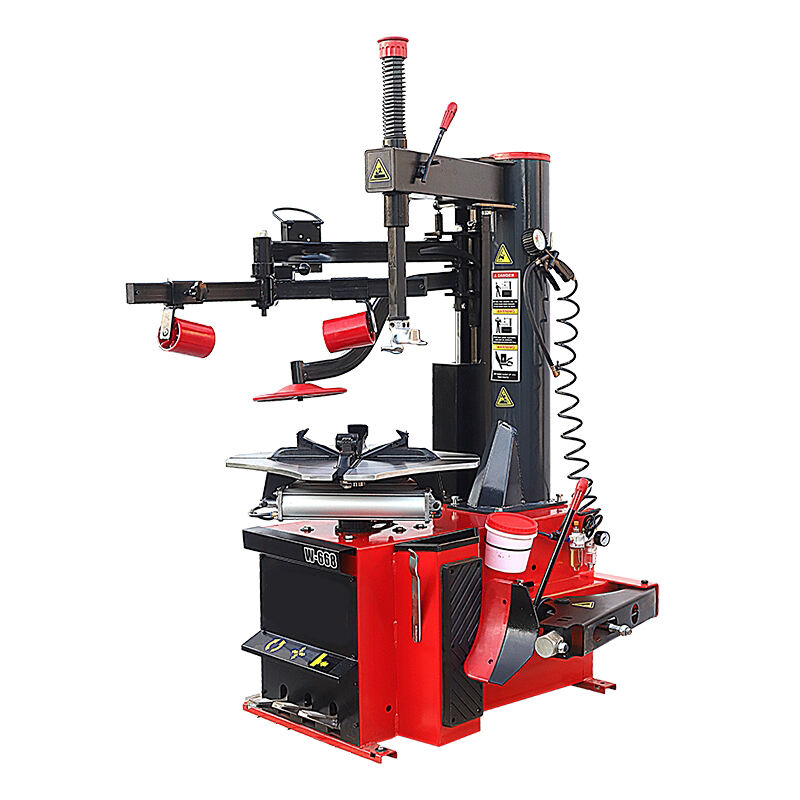Comparing Two Powerful Tire Solutions
For tire service providers looking for adaptable options, both portable and mobile tire changers offer distinct advantages depending on specific needs. When technicians need to work at customer locations, handle fleet maintenance jobs, or fix flat tires along highways, knowing what separates these two types of equipment becomes essential for making smart purchasing decisions that align with day-to-day operations. This article takes a closer look at how mobile versus portable tire changers stack up against each other, highlights important characteristics worth considering about both models, and ultimately identifies which solution works better for different kinds of businesses and scenarios across the industry.
Understanding the Basics of Tire Changing Solutions
What Makes Portable Tire Changers Stand Out
Portable tire changers come in handy when someone needs to change tires but doesn't do it all day long. Most models are either manually operated or have some basic automation features, and they take up minimal space in standard garages or even in those tiny trucks used for mobile services. These tools weigh less and occupy far less room compared to their industrial counterparts, so moving them around or putting them away between jobs isn't a big deal at all. That's why many weekend warriors who fix cars on the side find these devices really convenient, especially those who might need to grab a spare tool kit while responding to roadside emergencies.
Many portable tire changers can handle standard passenger vehicle tires, and some models support light-truck or SUV sizes. They are usually priced lower than full-service mobile units and require minimal setup, making them popular for pop-up shops or weekend operations.
How Mobile Tire Changers Transform Service
Mobile tire changers are essentially complete machines mounted right inside service vehicles ranging from standard vans to heavy duty trucks designed specifically for this task. What makes them stand out? They come equipped with all sorts of handy tools including powerful bead breakers that pop those stubborn tires loose, plus either pneumatic or hydraulic systems for mounting new rubber onto wheels. Most models also have their own onboard air compressor and electric inflater so techs don't need extra equipment lying around. The real advantage here is obvious when working at remote job sites or during roadside emergencies where bringing everything back to the main garage just isn't practical. With these mobile setups, mechanics can handle multiple tire changes throughout the day wherever they happen to be needed.
Mobile tire changers are often more robust and efficient than portable models, enabling operators to handle fleet work, emergency roadside assistance, and service in remote areas. They are ideal for businesses that offer full-service tire support outside traditional garage settings.

Key Comparison Criteria
Portability and Storage Considerations
Portable tire changers are known for their lightweight and compact design. They are easy to transport in a small vehicle or store in a limited workspace. If your business involves part-time operations or you need tire changing only on occasion, this level of portability can be invaluable.
Tire changers mounted on mobile units come integrated right into their service vans or trailers. These systems cant really be detached from their transport since the whole vehicle itself becomes the working area. Sure, finding enough room to park and work with them takes more space than standard equipment would need. But what these setups offer in return is pretty impressive actually a complete tire service center that can roll right up to where customers need it most without any extra setup required.
Service Capability and Volume
If your workflow involves occasional tire replacements or repairs on passenger vehicles, a portable tire changer could offer sufficient capability. Most machines in this category handle standard tire sizes and provide a cost-effective entry point to mobile tire service.
In contrast, mobile tire changers are built for volume and variety. They can handle light-truck tires, dual-wheel assemblies, and specialty rims. With powered assistance and integrated systems, technicians can work more efficiently and take on larger workloads without needing a shop.
Operational Benefits
Flexibility with Portable Tire Changers
Portable tire changers are great for businesses just starting mobile service or for mechanics working part-time at different locations. They require minimal powerâsome operate with just a hand pump or small air compressorâand can be set up quickly.
Theyâre ideal for farmers, emergency responders, or avid car enthusiasts with multiple properties. Since portable tire changers are simple to transport, technicians can bring them directly to the job site, spending less time traveling and more time working.
Mobile Tire Changers and Professional Efficiency
For businesses focused on fast, professional service, mobile tire changers offer more. Integrated power and air systems enable one-person operation without additional equipment. Features like quick-inflate nozzles and pneumatic controls speed up the job, while built-in organization keeps tools and accessories handy.
With a full mobile tire changer system, businesses can respond quickly to tire issues, complete service on-site, and expand their service areaâboosting customer satisfaction and creating new revenue streams.
Cost, Maintenance, and Return on Investment
Upfront Cost and Equipment Investment
Portable tire changers are generally more affordable upfront. Minimal electronics and manual operations mean lower initial pricing, ideal for small-scale operations or those exploring mobile service for the first time.
Mobile tire changers represent a higher investment when factoring in the vehicle, equipment, and installation costs. But this setup offers a mobile shop with rapid deployment capability, which can be attractive to high-volume service providers or fleet maintenance teams.
Long-Term Cost Efficiency
For occasional use, portable tire changers can help professionals avoid the ongoing costs of maintaining a full-service vehicle. They are easy to store, easy to transport, and require modest maintenance, which keeps overall costs low.
Mobile tire changers, though more expensive to maintain and operate, can offer higher long-term value. They increase revenue potential by enabling roadside service, fleet contracts, and emergency responseâall with a mobile tire service solution that can travel to customers.
Choosing Whatâs Right for Your Operation
Selecting Portable Tire Changers
If your business requires occasional mobile tire serviceâsuch as seasonal swaps, onsite demos, or field repairsâa portable tire changer may be ideal. Youâll benefit from lower costs, flexible use, and lightweight equipment thatâs easy to transport and store.
Portable units work well in environments like remote work areas, seasonal festivals, or small-scale farmer operations. They allow you to deliver reliable tire service without investing in a full mobile fleet.
Investing in Mobile Tire Changers
A mobile tire changer is the smart choice if your operation demands high efficiency and flexibility. Service businesses working primarily onsite, fleet managers overseeing widespread assets, or mobile mechanics under contract will appreciate the speed and capability of a fully equipped unit.
Mobile tire changers also support emergency tire careâflat repair, on-site replacementsâhelping providers differentiate themselves by delivering a premium, full-service experience.
FAQ
Whatâs the main difference between portable tire changers and mobile tire changers?
Portable tire changers are standalone, compact machines powered manually or with minimal electronics. Mobile tire changers are built into service vehicles and include additional conveniences such as built-in air compressors and inflators.
Can portable tire changers handle large or heavy-duty tires?
Portable tire changers are designed for standard passenger and light-truck tires. For heavy-duty, dual-wheel, or specialty rims, mobile tire changers with reinforced systems are more suitable.
Is training required for both types of tire changers?
Yes, safety and efficiency depend on proper training. While portable tire changers are simpler to use, mobile units often require training on pneumatic systems, bead-breaking techniques, and safety protocols.
Which option is more cost-effective in the long run?
Portable tire changers have lower upfront and operating costs and suit part-time or occasional use. Mobile tire changers are more costly initially but offer greater revenue potential and higher efficiency for full-time mobile tire service operations.

